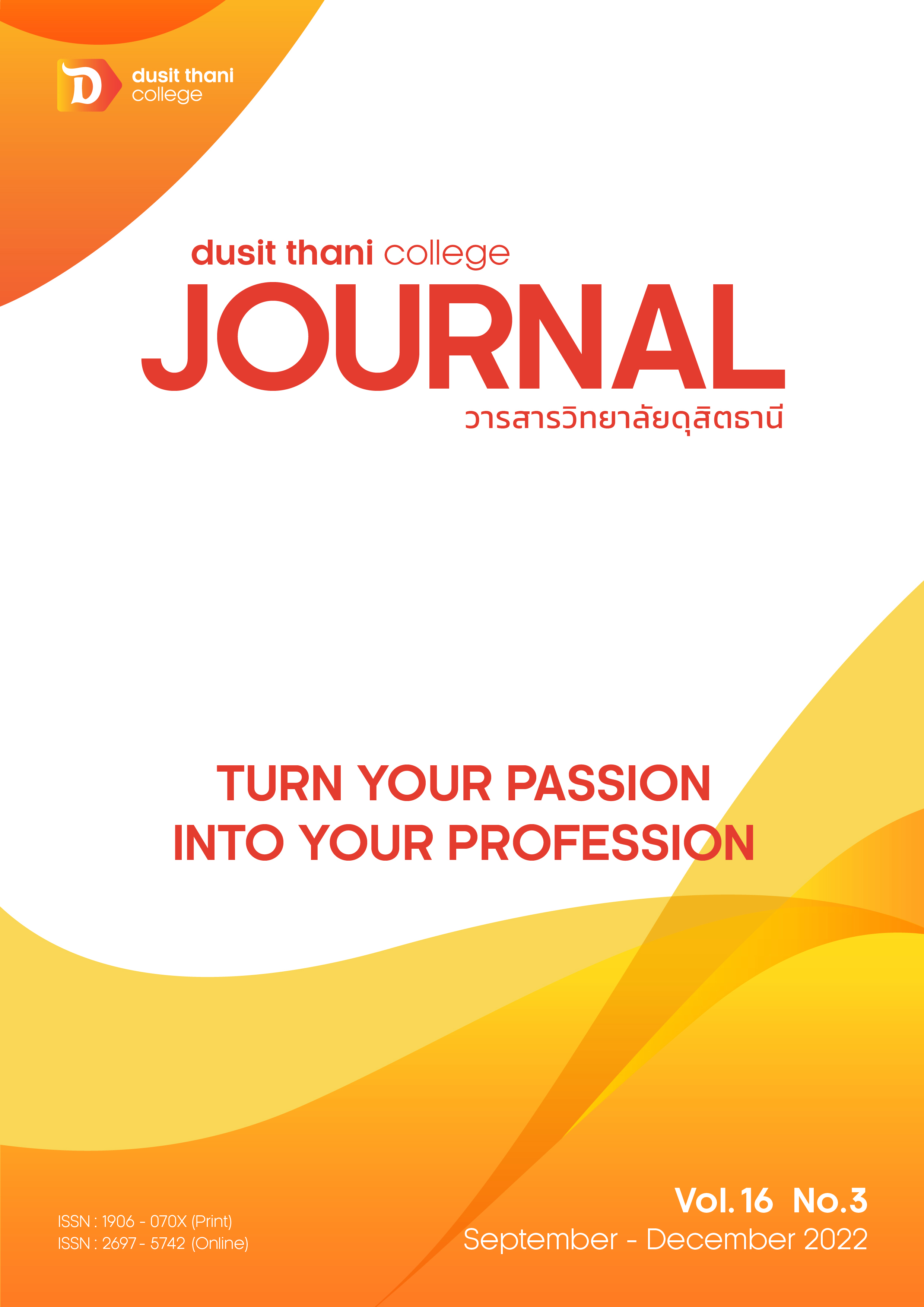The Study of Guidelines of Integrated Food Waste Management in Dusit Thani College
Main Article Content
Abstract
The purposes of this research were (1) to study the sources of food waste within the food supply chain of Dusit Thani College (DTC) (2) to analyze data on the quantity and characteristics of food waste in DTC, and (3) to develop an integrated food waste management model for DTC. This research used a structured interview form to conduct a focus group interview by categorizing the groups of people according to the food supply chain and used survey study to collect data and to analyze the rate of food waste, amount of food waste including surveys using questionnaires on food waste generation behavior and food waste management among those involved in the food supply chain. The research finding had led three conclusions. Firstly, the source of food waste from the food supply chain that occurred under DTC's operations will occur in stages of raw material storage, cooking and consumption both in kitchen practical classroom and in cafeteria. Secondly, Food waste generated can be divided into 3 types: avoidable, possibly avoidable and unavoidable food waste. The maximum amount of waste generated in the kitchen practical room was 125.2 kg, 5.21 kg and 61.25 kg respectively, while the maximum amount of waste generated in the cafeteria was 39.08 kg, 3.83 kg and 6.55 kg respectively. Finally, a intergated food waste management model throughout the college's operational supply chain includes the following stages: (1) prevention of food wasted at the sources (2) optimization and (3) recycle or composting food waste.
Article Details

This work is licensed under a Creative Commons Attribution-NonCommercial-NoDerivatives 4.0 International License.
Article Screening Policy
- All research and academic articles to be published must be considered and screened by three peer reviews in the relevant field / article.
- All articles, texts, illustrations and tables published in the journal are the personal opinions of the authors. Editors don't always have to agree. And no responsibility whatsoever is the sole responsibility of the author.
- The articles to be published must never be published. Where did you first publish? And not in the consideration of other journals If the audit found that there has been a duplicate publication It is the sole responsibility of the author.
- Any article that the reader sees as being plagiarized or impersonated without reference. Or mislead the work of the author Please let the journal editor know it will be your greatest blessing.
References
Ajzen, I. (1991). The theory of planned behavior. Organizational Behavior and Human Decision Processes 50 (2) : 179-211.
Barone A.M., Grappi S., Romani S., (2019). “The road to food waste is paved with good intentions”: When consumers' goals inhibit the minimization of household food waste Resour. Conserv. Recycl., 149, pp. 97-105
Betz, A., Buchli, J., Göbel, C., Müller, C., (2015). Food waste in the Swiss food service industry–magnitude and potential for reduction. Waste Manage. 35, 218–226.
FAO, (2018). “Food loss and waste and the right to adequate food: Making the connection” [Online]. Access: http://www.fao.org/3/CA1431EN/ca1431en.pdf
Fishbein, M., and Ajzen, I. (2010). Predicting and changing behavior: the reasoned action approach. New York: Psychology Press.
Gustavsson, J., et al., (2011). Global Food Losses and Food Waste. Food and Agriculture Organization, Rome, Italy.
Long Qian, Feng Li, Baoming Cao, Lingen Wang, Shaosheng Jin, (2021). Determinants of food waste generation in Chinese university canteens: Evidence from 9192 university students, Resources, Conservation and Recycling, Volume 167
Newman, B., Kaosa-ard, J., Sorndee, K. (2016). The Study on Quantity and Composition of Food Waste in Srinakharinwirot University for Estimation of Biogas Production Potential. Faculty of Engineering, Srinakharinwirot University.
Oliveira, B., Moura, A. P., Cuhna, L. M. (2016). Reducing food waste in the food service sector as a way to promote public health and environmental sustainability. Climate change and health book subtitle: Improving resilience and reducing risks. Basel: Springer.
Papargyropoulou, E., Wright, N., Lozano, R., Steinberger, J., Padfield, R., Ujang, Z., (2016). Conceptual framework for the study of food waste generation and prevention in the hospitality sector. Waste Manage. 49, 326–336.
Pinto R.S., Pinto R.M.D.S., Melo F.F.S., Campos S.S., Cordovil C.M. (2018). A simple awareness campaign to promote food waste reduction in a University canteen.University of Lisbon.
Russell, S.V., Young, C.W., Unsworth, K.L., Robinson, C., (2017). Bringing habits and emotions into food waste behavior. Resour. Conservation Recycl. 107–114.
Soorani F., Ahmadvand M., (2019). Determinants of consumers’ food management behavior: Applying and extending the theory of planned behavior. Waste Manage., 98
Silvennoinen, K., Heikkilä, L., Katajajuuri, J.M., Reinikainen, A., (2015). Food waste volume and origin: Case studies in the Finnish food service sector. Waste Manage. 46, 140–145.
Junsuthonpoj, S., (2017). Relationships between Attitude and Water Resource Conservation Behavior of Responsible Person for Water Management: A Case Study of 3 Stars - Hotel in Bangkok. Dusit Thani College Journal Vol. 14 No.1
Thailand Development Research Institute. (2019). Study on the Management of Excess Food to Reduce the Problem of Food Waste Suitable for Thailand. [Online].
Access: https://tdri.or.th/2019/09/food-waste-management/
Wiphataphan, P. Piyapanan, R. Saengphet, T. Supphakhot, N. Limsuwan, K., (2020). CU Zero Waste Case Study “Waste Management of Canteens of Chulalongkorn University” [Online]. Access: http://www.ej.eric.chula.ac.th/content/6135/284


